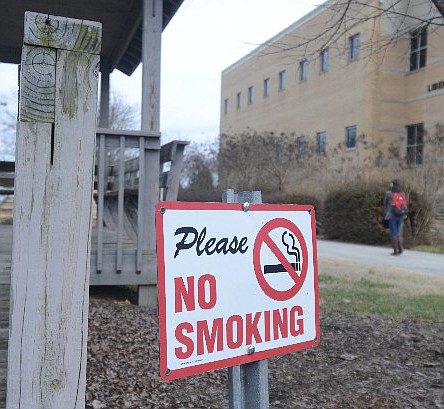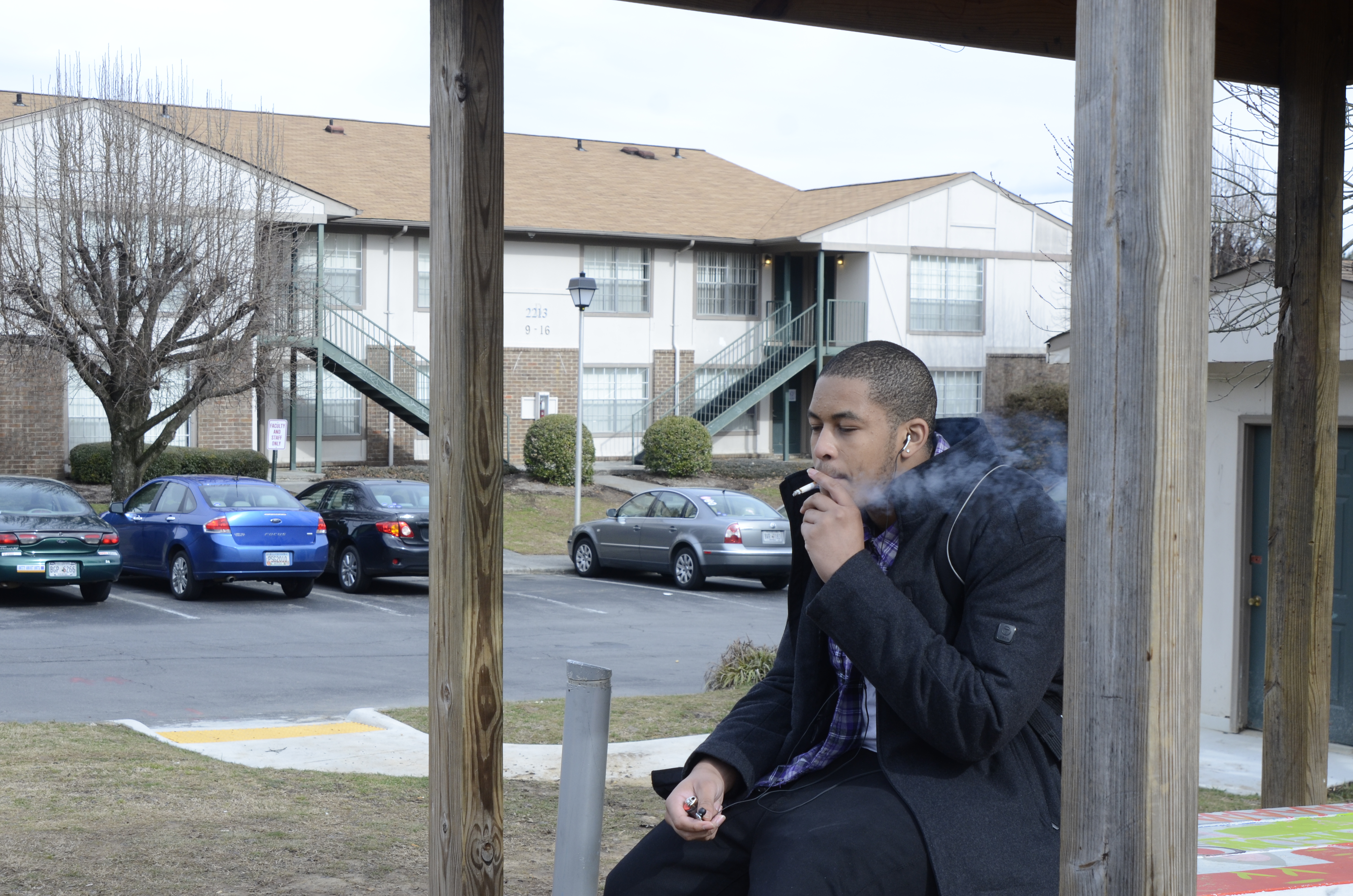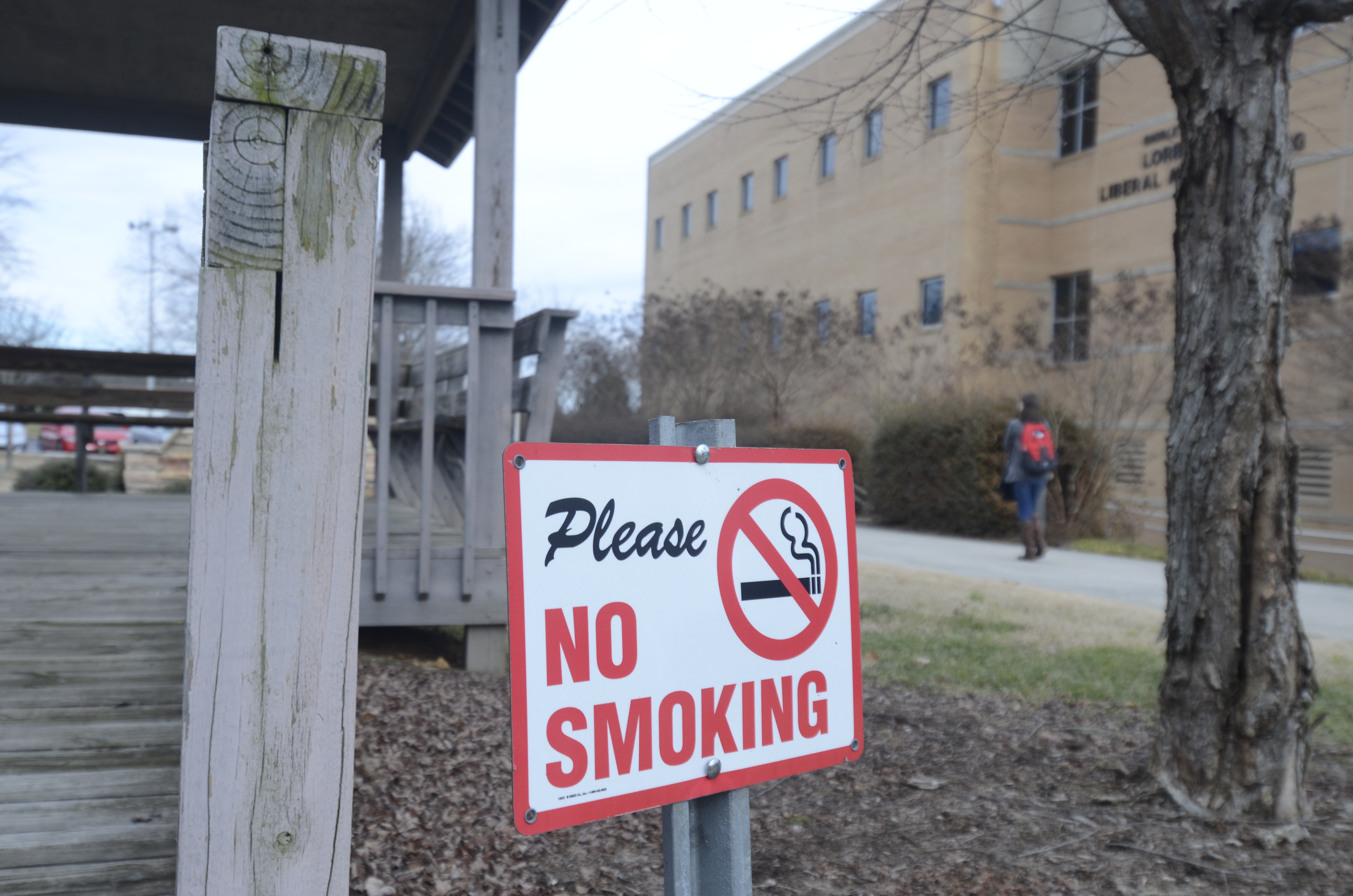Georgia university system to consider tobacco ban on campuses
Monday, January 20, 2014
On the way back to his apartment on the residential property of Dalton State College, Timon Wilson will sometimes make a quick stop. He is not a chain smoker, but as an 18-year-old freshman experiencing the rigors of college life for the first time, Wilson puffs an occasional cigarette after class.
"I'm under 21, so it's not like I'm drinking," Wilson said. "I'm smoking a cigarette."
With the exception of the smoking hut Wilson visits, Dalton State is a tobacco-free campus. In a 2008 survey at the school, 67 percent of participants voted for the ban, which includes smokeless forms of tobacco.
But even the occasional smoke in a designated area by Wilson and other college students across Georgia may become a thing of the past in 2014.
The Board of Regents of the University System of Georgia that oversees Dalton State, the University of Georgia and 29 other universities and colleges in Georgia heard a proposal to ban all forms of tobacco on member campuses at its first meeting of the year.
The regents are set to vote on the Tobacco and Smoke Free Policy at their next meetings Feb. 11-12. A majority vote would soon send students like Wilson hiking down the street, bound for somewhere off-campus to inhale a post-class buzz. It would also prohibit the 92,000-plus football fans filling the UGA campus on fall Saturdays from lighting up or packing a lip.
Early indications, said Phillip Wilheit, chair of the Regents and a Gainesville, Ga., resident, are that the measure created by USG's human resources personnel will pass.
"I personally feel a great responsibility to protect our students from their own devices and also to protect the students from secondhand smoke," Wilheit said.
Another Regent, Larry Ellis of Atlanta, indicated his support for the policy.
"This is about behavior modification," Ellis told the Athens Banner-Herald. "That's what we're all about in higher education."
By contrast, Wilson sees the potential ban as an infringement on what the college experience is about.
"College is supposed to be a transition into adult life," said Wilson, a business management major, "yet y'all don't want us to do the things adults do."
Restriction of tobacco from the college campus is not a new idea, but its popularity is growing, experts say. In Oklahoma, state law prohibits tobacco from public university campuses, and some schools with national brand recognition like UCLA and the University of Kentucky don't allow tobacco use on campus either. The University of Arkansas, Ole Miss, the University of South Carolina and the University of Missouri are each SEC schools that have banned smoking.
In Tennessee, the UT-system and Tennessee Board of Regents each maintain policies regarding tobacco use, but leave possible bans up to the individual institutions they govern. Tennessee Tech, Middle Tennessee State and East Tennessee State are among those that have banned tobacco.
In Georgia, according to the American Nonsmokers' Rights Foundation, which tracks schools nationwide that adopt tobacco-free policies, 20 schools in the state, many of them technical colleges and non-USG institutions, have banned tobacco from their campuses. Those numbers don't include schools like Dalton State that allow tobacco only in specific spots.
Locally, Georgia Northwestern Technical College and its six campuses, including one in Walker County, is among the non-USG schools that have banned tobacco to a level complicit with ANR standards.
But of the 31 USG schools, only six and UGA's Health Sciences campus have banned tobacco to the standards of ANR. Thus passage of the policy would affect tobacco users at colleges and universities statewide.
Scott Smith of Ringgold, a Regent representing the 14th district, said it may be too early to predict which way the proposal will go as the regents continue to vet the issue.
"My guess is if we did take action on the issue, it would probably be to make it more consistent with the 31 colleges and universities to add consistency to it," Smith said. "Sometimes you want to give flexibility to schools, but it does help you to have consistency across the board so that there is not confusion."
UT's campuses in both Chattanooga and Knoxville simply adhere to the UT-system policy, which prohibits smoking in all buildings owned or operated by the university and within 25 feet of doorways and windows. Tennessee law prohibits smoking in all buildings owned or operated by the state, which includes property owned by publicly funded universities.
Tennessee's Board of Regents complies with the law by simply banning smoking in all buildings that it owns or operates, but some of its member universities have elected to draft their own regulations.
MTSU implemented a tobacco policy on Jan. 1, 2012, that bans all tobacco use on campus except for in personal vehicles.
Jimmy Hart, spokesman for MTSU, said that after some initial grumbling about the policy the campus is flourishing as a tobacco-free environment.
"You'll see people trying to sneak in a smoke," Hart said. "But the message sent is that if we any of those incidents, we bring it to their attention that it's a tobacco-free campus, and for the most part people comply with it."
The successful adaptation of MTSU and its undergraduate population of 21,162 to the policy could provide a model for UGA if Georgia's regents pass the anti-tobacco policy next month. Smoking at UGA is currently banned inside buildings and within 35 feet of entrances.
But Hart warned that MTSU's relatively smooth implementation of the policy came only after an extensive awareness campaign prior to the switch.
"We're two years into this," he said, "and it's just a part of the culture now."
Nationwide, the trend of a tobacco-free campus is growing rapidly, said Bronson Frick, associate director of ANR.
As of Jan. 2 at least 1,182 campuses nationwide are smoke-free and of those 811 are tobacco-free, ANR reported.
"Ultimately it's about questioning what the role of tobacco is in an academic setting," Frick said. "The fact that it has snowballed from just a handful of schools to over a thousand shows that this policy is not only popular, but that schools don't want to go back to the way things were."
That is of little solace to Wilson, who is doubtful that an on-campus ban would stop tobacco users at Dalton State from getting their buzz.
"It'll just cause a whole commotion," Wilson said. "Not a rebellion, but a whole lot of people won't listen to it."
Contact staff writer David Cobb at dcobb@timesfreepress.com or 423-757-6731.


